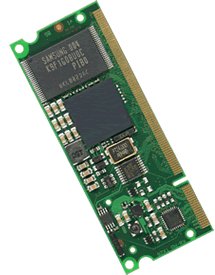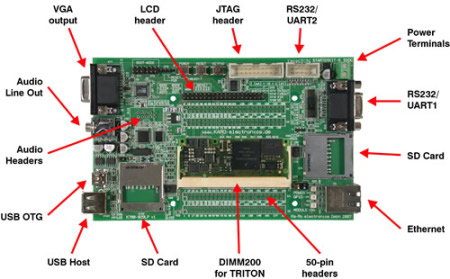SODIMM-sized module uses Freescale’s i.MX28
Oct 12, 2010 — by LinuxDevices Staff — from the LinuxDevices Archive — 5 viewsDirect Insight announced a SODIMM-sized computer-on-module (COM) based on Freescale's ARM9-based i.MX28 system-on-chip. The 455MHz, 2.7 x 1.0-inch Triton-TX28 module offers extensive I/O, including Ethernet and USB 2.0 On-The-Go and host, plus an available “StarterKit-5” baseboard with a Linux board support package, says the company.
 Like certain other SODIMM-sized modules from U.K.-based Direct Insight, the Triton-TX28 (left) is manufactured by Germany's Ka-Ro Electronics. (Direct Insight also re-labels modules from Variscite of Israel, a recent example being the Texas Instruments DM3730-based SwiftModule-DM.)
Like certain other SODIMM-sized modules from U.K.-based Direct Insight, the Triton-TX28 (left) is manufactured by Germany's Ka-Ro Electronics. (Direct Insight also re-labels modules from Variscite of Israel, a recent example being the Texas Instruments DM3730-based SwiftModule-DM.)
Ka-Ro announced the module itself last week, but we're giving the nod here to Direct Insight, whose release tipped us to its existence. The Triton-TX28 offers one of the 454MHz, ARM9-based i.MX28 devices that were announced by Freescale just last month.
More specifically, the Triton-TX28 is said to employ the high-end i.MX287, which includes dual CAN interfaces, dual Ethernet ports, and a Layer 2 switch, according to Freescale. Other I/O cited by the chipmaker for its SoC includes USB 2.0 Host and On-The-Go ports, plus six UARTs and eight PWM interfaces. (For full details of the i.MX287 and its siblings, see our previous coverage, here.)
According to Direct Insight, while the i.MX287 itself might have two Ethernet MACs (media access controllers), the Triton-TX28 offers only one PHY (physical layer) device. However, the module does sport two CAN interfaces, the company says.
The module is also said to have an LCD controller that supports resolutions up to 800 x 480 pixels, with optional touchscreen support, plus three RS232 ports, USB host and On-the-Go ports, and an SD/SDIO port. Other interfaces, all of which travel to and from the outside world via the 200-pin DIMM connector, include I2C, SSP, SPI, PWM, and JTAG, according to Direct Insight.
Direct Insight says the Triton-TX28 includes 128MB of 400MHz DDR2 RAM and 128MB of NAND flash storage. The device operates on power ranging from 3.1 to 5.5 Volts, and, when used with the baseboard below, may be entirely USB-powered, the company adds.

StarterKit-5 baseboard
(Click to enlarge)
An optional 640 x 480 touchscreen is also available that connects via the baseboard's 40-pin LCD header. In this case, the power draw becomes too great for USB, so a li-ion/polymer battery or external power supply is required, the company says.
Specifications listed for the Triton-TX28 include:
- Processor — Freescale i.MX287 clocked at 454MHz
- Memory — 128MB of 400MHz DDR2 RAM
- Storage — 128MB NAND flash
- Display:
- LCD controller supports up to 800 x 480 pixels
- Optional 640 x 480 touchscreen connects to baseboard
- Networking — 1 x 10/100 Ethernet PHY; 2 x MACs
- Other I/O interfaces:
- 1 x USB 2.0 host
- 1 x USB On-The-Go
- 2 x SSP
- 3 x RS232 UARTs (D-SUB 9 on baseboard)
- 2 x SD/SDIO (4-bit)
- 1 x SPI
- 1 x PWM
- 1 x JTAG
- 2 x CAN
- Other features — audio, external RTC (DS1339)
- Operating temperature — -40 to 185 deg. F (-40 to 85 deg. C)
- Dimensions — 2.7 x 1.0 inches (68 x 26mm); SODIMM200 connectors
- Operating system — Linux 2.6; Windows CE 6.0
Further information
The Triton-TX28 costs around 79 Euros (about $110 U.S.) in quantities of 100 or more, according to Direct Insight. More information may be found on the company's website, here.
Ka-Ro's product page for its own-brand version of the module may be found here.
This article was originally published on LinuxDevices.com and has been donated to the open source community by QuinStreet Inc. Please visit LinuxToday.com for up-to-date news and articles about Linux and open source.